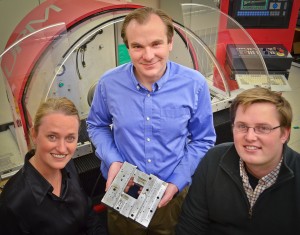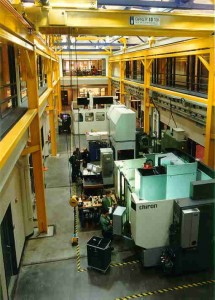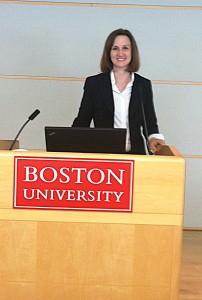Imagine if a clinician had the tools to reveal the early stages of lung cancer through just a nose swab, detect liver and skin cancer with a simple blood test, or prescreen for colon cancer without the need for a colonoscopy.
These are some of the goals of the research projects that are supported by the Center for Future Technologies in Cancer Care (CFTCC) at Boston University. The CFTCC was founded in July 2012 with help from a five-year, $9 million grant from the National Institute of Biomedical Imaging and Bioengineering (NIBIB) at the National Institutes of Health. The Center’s mission is to move some of the burden of cancer treatment, screening and diagnosis out of specialized centers and into local clinics or home care use around the world. The driving notion is to bring tests conveniently to the patient that provide immediate results to improve patient outcomes and lower healthcare costs. The focus on point-of-care treatment stems largely from patients having to travel a distance or take time off of work to see a specialist, which can result in delays in care and follow-up treatment. Additionally, in low resource settings, there may not be enough well-trained surgeons or other specialists to treat all patients in need.
 To address these issues, the CFTCC evaluates new technologies at various stages of development for their suitability across a range of primary care and non-traditional healthcare settings. Future technologies seek to allow providers who have less specialized training to treat more patients at lower cost. The Center focuses on the identification, prototyping, and early clinical assessment of innovative point-of-care technologies for the treatment, screening, diagnosis and monitoring of cancers with the overall goal of transitioning functional prototypes out of the Center toward later stage clinical testing and commercialization.
To address these issues, the CFTCC evaluates new technologies at various stages of development for their suitability across a range of primary care and non-traditional healthcare settings. Future technologies seek to allow providers who have less specialized training to treat more patients at lower cost. The Center focuses on the identification, prototyping, and early clinical assessment of innovative point-of-care technologies for the treatment, screening, diagnosis and monitoring of cancers with the overall goal of transitioning functional prototypes out of the Center toward later stage clinical testing and commercialization.
A major aspect of this effort is to promote research collaborations between engineers, clinicians and industry partners. The CFTCC fosters collaborations between these stakeholders and offers a variety of additional support to the teams. The Center is comprised of different Cores which are available to qualified Center Projects. The Prototype Development and Testing Core consists of the Alpha Core and Beta Core prototyping labs on the Boston University campus. The Alpha Core provides scientific expertise and manufacturing resources that enable researchers to build rapid prototypes of their devices. The Beta Core, in collaboration with the Boston University-Fraunhofer Alliance, provides scaled-up production and advises on the suitability of mass production. The Training Core offers workshops and meet-ups that bring a broad range of stakeholders together in settings where cross-fertilization of ideas can be facilitated. Several seminars that are open to the public are held throughout the year to train people in topics including regulatory issues, good manufacturing practices, and working with institutional review boards. The Clinical Needs Assessment and Impact Analysis Core identifies unmet medical needs perceived by clinicians, patients and the medical device industry.
Catherine Klapperich, the CFTCC director and an Associate Professor of Biomedical Engineering and Mechanical Engineering, encourages anyone to seek advice and/or apply for support from the Center. The only requirement is that the project is related to cancer care. More information for the center can be found at www.bu.edu/ftcc/.

